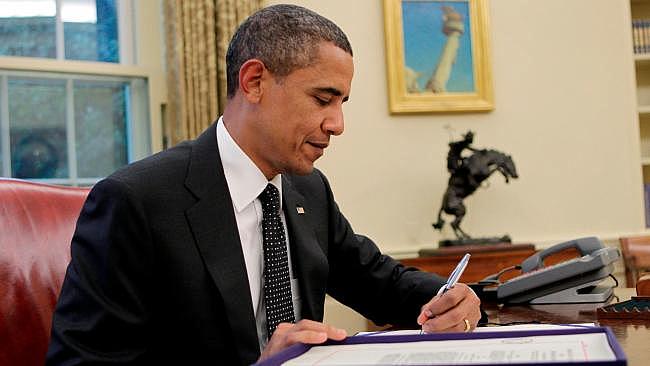Crowded Prisons, Immigration Reform and the Power of the Presidency

With a stroke of his pen (Image courtesy Wikimedia Commons)
By Bill Walker
In his fifth State of the Union Address, President Obama declared that he would defy a do-nothing, obstructionist Congress and use his executive authority to address the ever-growing gap between the richest Americans and the rest of us. "America does not stand still," the president said, "and neither will I. So wherever and whenever I can take steps without legislation to expand opportunity for more American families, that’s what I’m going to do."
Raising the minimum wage and other executive actions to fight inequality are important steps, and they are directly connected to improving public health. But there are other crises the president can tackle with the power of his office. Two of the most serious are, like inequality, strong determinants of public health.
In a Feb. 24 op-ed in The New York Times, Bill Keller points to "the famously shocking numbers of Americans behind bars." With 2.3 million prisoners, the incarceration rate in the United States is by far the highest in the world – with only 5 percent of the world's population, we have locked up nearly one-fourth of the prisoners on earth.
Much of the increase in incarceration has come from harsh mandatory sentences for non-violent drug offenders and people with mental health issues – people who need treatment, not punishment. Last year, Human Impact Partners' Health Impact Assessment on reducing the prison population in Wisconsin found that sending non-violent offenders to treatment rather than prison would mean healthier lives, stronger families and safer communities. Treatment is much more likely to help people recover from substance abuse, reduce the need for future psychiatric care, and improve the health of children by keeping their parents at home, not behind bars.
And yet, writes Keller, Obama – a former community organizer in inner-city Chicago – "has had surprisingly little to say about the shadow cast by prisons on the families left behind, about the way incarceration became the default therapy for drug addicts and the mentally ill, about the abject failure of rehabilitation." Although Attorney General Eric Holder has recently been more bold about urging states to rethink the cruel consequences of incarceration, the Administration has done little to reduce drug prosecutions or provide more money for treatment programs. Of the 8,000 people in federal prison because of outdated crack cocaine laws, which disproportionately ensnare young black men, last year Obama pardoned only three.
In the same issue, the Times reported on the annual congress of United We Dream, a national network of immigrant youth, many whose parents are undocumented, and many of whom wwere once undocumented themselves. Many Dreamers, as they call themselves, live in daily fear that their families will be torn apart by the arrest and deportation of their parents.
During his presidency, Obama has deported almost 2 million undocumented immigrants, more than any other president. Human Impact Partners' recent study of the health impacts of immigration reform found that if deportations continue at the present rate, each year more than 150,000 children will have a parent taken away, pushing more than 80,000 households into poverty and triggering poorer health or behavioral problems for 100,000 children.
The Dreamers called on the president "to cut back programs that have greatly expanded the reach of federal immigration authorities" and grant deportation deferrals to the parents of the more than 520,000 youth who have also received deferrals. In words that echo the Human Impact Partners study, United We Dream's Cristina Jiméniz said: “These deportations are ripping our families apart; this has to stop. And we know the president has the power to do it.”

